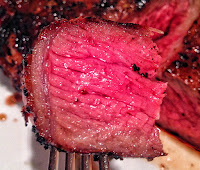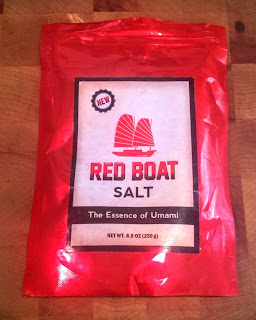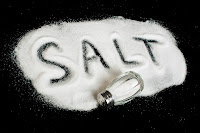Faux Aging- Contrasting Fish Sauce & Salt

 This post is not exactly new but just specific to Fish-Sauce/Salt faux aging. And of course, it's been updated too. Here is the link to the original post where I combined Faux Aging with Warm-Aging using 4 steaks as my canvas. A lot of details if you are into that which are in an excel spreadsheet to document the results.
This post is not exactly new but just specific to Fish-Sauce/Salt faux aging. And of course, it's been updated too. Here is the link to the original post where I combined Faux Aging with Warm-Aging using 4 steaks as my canvas. A lot of details if you are into that which are in an excel spreadsheet to document the results. 

That's right you're looking at Fish Sauce/Salt in the pictures. Drum roll, please…. you can use Fish Sauce/Salt to create/simulate a tender piece of meat or more accurately simulate a dry-aged steak with robust beefiness. I first read about it HERE, and as you can tell, there's not much info on the "why." I will try to give you my non-Scientific reason why this works. It's all about the Glutamates (natural MSG), which are savory compounds, and your tongue loves them. They make all cooked protein taste good.
Fish sauce, as well as Worcestershire sauce, contain anchovies (more in fish sauce) and a compound called a nucleotide. Nucleotides plus glutamates mean over the top awesome beefy goodness.
So whether it's Soy, Worcestershire, or fish sauce, the glutamate component plus the nucleotide that's found in anchovies will amp up the taste of beef and give it that UMAI boost of flavor. The salt in these ingredients will also help denature the protein making it more tender.
You ever wonder why in recipes like stews, chili, or beef stir-frys, it calls for these types of sauces? It's just an ingredient to a recipe with no explanation, but if you want to amp up the flavor, they're a must.
You ever wonder why in recipes like stews, chili, or beef stir-frys, it calls for these types of sauces? It's just an ingredient to a recipe with no explanation, but if you want to amp up the flavor, they're a must.
Let me get this question out of the way before proceeding. Does it taste Fishy? When it comes out of the bag, it smells clean and very beefy.
So how do you do Faux Age? Since the writing of the original post, I've faux aged beef at least 200 times.
Which brands are the best? You can use any brand you want, but I am a massive fan of Red-Boat products.
If you are using fish sauce, I would suggest starting out with 1.75%. Some use 3%, but I have found after many trials that 3% is the way to high for me. Depending on the thickness, I like to use 1.75-2.25%. If it's a thin piece of meat, go with 1.75% to start out with. What is thick? Over 1.5 inches or more. How do you compute percentages?
To make life easier, and to be precise, you must use grams.
If the protein weighs 1000 grams and you want 1%, it's a matter of multiplication.
1000 grams x 1% = 10 or 1000 grams x .01 = 10 grams.
How to apply? Use gloves!!!!!! Brush on the fish sauce and Vac Seal. If you have a chamber vac, this is easy peasy. If you have a pull vac sealer, use caution because some of the sauce can be sucked up into the machine. If you a food-saver type machine I would suggest the following. Brush on the sauce and place it in a plastic container that is just large enough to hold the protein. Rotate meat and schmush around containers every 12-Hours. Do this over 72-Hours. In a vac bag, you just need to wait out the 72-Hours. Before you send me several questions about other techniques…..don't….I've done it several different ways, and I have found this to be the best and easiest.
Now on to the Fish Salt. As of this writing, I believe that Red-Boat is the only one that carries the Salt version. I only use 1%. Also, I prefer Fish Salt to the Sauce version. Anyhow rub the fish salt all over the meat and vac seal for 72-Hours. In fact, the whole family does. Here's an experiment I ran to see what the preference was.
NOTE: DO NOT RINSE OFF ANYTHING.
NOTE: Brush or Sprinkle on both sides (Top, bottom, and sides) of the protein, getting it into every nook and cranny.
How to cook your steak? The same way you did it before you read this post. Do not add any additional salt.
NOTE: Brush or Sprinkle on both sides (Top, bottom, and sides) of the protein, getting it into every nook and cranny.
How to cook your steak? The same way you did it before you read this post. Do not add any additional salt.
HERE IS MY LIST OF ALL MY EXPERIMENTS
Here's a link where I compared 5 Fish Products!!!! And the winner is?
Here's a link where I compared 5 Fish Products!!!! And the winner is?



Comments
Post a Comment